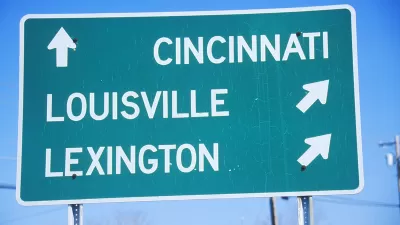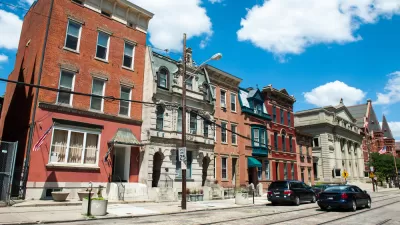A new study examines gentrification (measured by relative income) at the neighborhoods, revealing the unique case of Cincinnati, which increased wealth faster during the recession than it did during the preceding boom.

Randy Simes provides analysis of a report by the Federal Reserve Bank of Cleveland that examines gentrification during the pre-recession boom of 2000-2007 with what happened after by comparing the neighborhoods that either gained or lost wealth in those two periods.
According to the study, "the majority of 59 cities studied now fall between either a 1 percentile decline or 1 percentile increase between 2007 and 2010. This is in contrast to the housing boom period, which saw cities like Atlanta and Washington, D.C. move up 8.7 and 5 percentiles respectively."
"The results of their research found that only a select handful of regions reasonably continued to see relative wealth growth in their principal cities," adds Simes. The report also "detected one region that bucked the trend and actually increased its gains over the housing boom period": Cincinnati, which did not increase it's income ranking during the boom period before the recession, but increased on the same metric at a pace similar to that of Denver of Washington D.C. during the recession.
FULL STORY: Chart of the Day: Here's why Cincinnati's gentrification process is unique

Alabama: Trump Terminates Settlements for Black Communities Harmed By Raw Sewage
Trump deemed the landmark civil rights agreement “illegal DEI and environmental justice policy.”

Planetizen Federal Action Tracker
A weekly monitor of how Trump’s orders and actions are impacting planners and planning in America.

The 120 Year Old Tiny Home Villages That Sheltered San Francisco’s Earthquake Refugees
More than a century ago, San Francisco mobilized to house thousands of residents displaced by the 1906 earthquake. Could their strategy offer a model for the present?

In Both Crashes and Crime, Public Transportation is Far Safer than Driving
Contrary to popular assumptions, public transportation has far lower crash and crime rates than automobile travel. For safer communities, improve and encourage transit travel.

Report: Zoning Reforms Should Complement Nashville’s Ambitious Transit Plan
Without reform, restrictive zoning codes will limit the impact of the city’s planned transit expansion and could exclude some of the residents who depend on transit the most.

Judge Orders Release of Frozen IRA, IIJA Funding
The decision is a victory for environmental groups who charged that freezing funds for critical infrastructure and disaster response programs caused “real and irreparable harm” to communities.
Urban Design for Planners 1: Software Tools
This six-course series explores essential urban design concepts using open source software and equips planners with the tools they need to participate fully in the urban design process.
Planning for Universal Design
Learn the tools for implementing Universal Design in planning regulations.
Clanton & Associates, Inc.
Jessamine County Fiscal Court
Institute for Housing and Urban Development Studies (IHS)
City of Grandview
Harvard GSD Executive Education
Toledo-Lucas County Plan Commissions
Salt Lake City
NYU Wagner Graduate School of Public Service




























